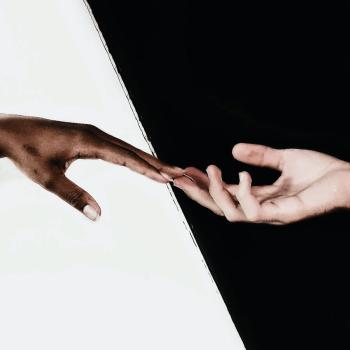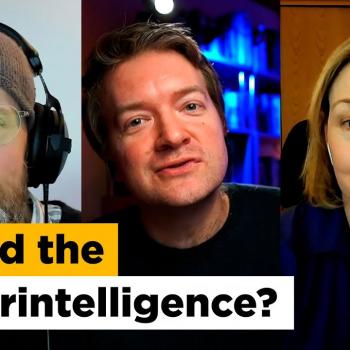
Christians on both sides of the Atlantic were taken aback when Jon Steingard announced on social media that he was finding he could “no longer believe in God”. But a recent dialogue on suffering suggests the former Hawk Nelson rock singer may still be making up his mind about faith.
Back in June, Jon was invited onto Unbelievable? to share some of his big questions with apologist Sean McDowell (you can read more about this here). One area they didn’t have time to delve deeply into was suffering, which was a key factor in Jon’s deconversion. So, Justin Brierley, host of Unbelievable?, encouraged Jon to share his thoughts in another episode alongside apologist Amy Orr-Ewing who has recently published a book called Where is God in all the Suffering?.
Once the podcast went live, Jon shared it on his social media, saying: “For those that have been following my journey – you can see that my views seem to be a moving target. This conversation gave me a lot to consider afterwards. Grateful for it.”
During the show, he even revealed that Christian apologist CS Lewis is still his favorite author and he had recently re-read The Great Divorce.
So, what happened on this recent podcast? Here’s my take on a remarkable conversation.
Is Christianity loving?
“I travelled to Uganda to do some documentary film work for a small non-profit…they work with this people group called the Batwa (who have experienced) a lot of disease, a lot of deaths and a lot of children were orphaned…It became very difficult for me to reconcile the idea of a loving, powerful God with the things that I saw.” Jon Steingard on Unbelievable?
I really resonate with Jon’s honest comments throughout the show. He is certainly not alone in questioning the existence or character of God because of suffering. My own journey into apologetics began because of these exact questions. Like Jon, I grew up as a pastor’s kid in a loving Christian family. I had a genuine faith of my own, but I never really questioned why I believed. And I never thought to interrogate any of those beliefs.
When I later studied theology at Oxford University, it felt as if every part of my faith was not only questioned, but brutally ripped apart by atheist professors and students. Gradually, with the help of some great Christian theologians and through reading the Bible, I began to put my faith back together and it actually emerged much stronger post-questioning.
However, a few months later a close friend of mine tragically died by suicide. It felt like the faith I’d just begun to reconstruct began to crumble again. This time, my objection was emotional rather than intellectual. It took a while to get back to a place where I could believe in a loving God and trust him with my life. And I think this is the crux of most people’s questions about God, regardless of how they are articulated: is God loving and can I trust him?
Throughout the show, Amy’s responses to Jon were compassionate and honest, but they were also grounded in sound philosophy and theology. Referring to Jon’s inherent sense of injustice at seeing the suffering of the Batwa people – particularly the children – she said:
“Our instinct to cry out for justice on behalf of a human being, even someone that we’re not directly connected to, says something about what we believe a human being is…How do we account for that sacredness that we that we seem to be perceiving in another human being’s life? The Christian story actually can account for that – it says that human beings are created in the image of God, that whether we believe in him or not, all human beings lives are sacred because they’re marked by God’s image…our cry for justice points towards God, not away from him.”
Is Christianity useful?
While Jon probably no longer reads the Bible in the way that he used to, he revealed that he still finds some helpful responses to suffering contained within its pages:
“When I look at scripture, I’m really comforted by the fact that the questions I’m asking are not new…many of the Psalms are laments…or look at Job – that entire book is trying to make sense of suffering.”
Jon does, however, raise some important questions about the veracity of various texts. Were some parts of the Bible and Christian doctrine merely written to try and explain the origin of suffering?
“I look at Christian thought (and wonder whether) this explains the origins of suffering, then we started to create ideas as to why that might be…if you look at Greek mythology, so much of that is trying to explain suffering – you know, the gods are angry at us and we got to please them – and there’s aspects of Christianity that remind me of that, especially in the Old Testament.”
Unlike many before him who have begun to lose their faith and thrown out the proverbial baby with the equally proverbial bath water, Jon is keen to acknowledge the utility of many Christian ideas. He sees “a lot of good things about Christianity” and recognizes the benefit of framing questions of suffering in a Christian context:
“If it can help you shoulder the burden of suffering and make life more manageable, then that’s a good thing.”
However, just because something is expedient or helpful, doesn’t make it true and this is something Jon was also keen to stress on the podcast. With characteristic humility, Jon admits he is still wrestling with the question of whether Christianity is true and whether he can believe it.
Is Christianity true?
Jon pointed out that there is a disparity in people’s reaction to suffering – sometimes it seems to draw people closer to God and other times it moves them away. This is confusing and I must admit that I, like Jon have “wondered a lot about why that might be”. Also, like Jon, I must admit this is a “hard question because there aren’t easy answers there”.
I wonder if too often – particularly when it comes to the problem of suffering – we’re erroneously searching for perfect answers (“there’s this propensity for us to always want explanations for things”); a rational explanation of what is happening and why. I do think the Christian worldview can offer some helpful insights into this difficult issue but, I also think Jon is right about there not being any easy answers. Perhaps what we’re offered is not a neat answer, but a person to come alongside in our suffering.
And perhaps that is what we need. If I was to give you a perfect answer to the question of why you are suffering whatever it is you are going through right now – the terrible medical diagnosis, heart-rending relationship breakdown, crippling debt – would it make you pain any less severe? I don’t think so.
If one of our children fell over in front of us, we wouldn’t explain to them that they were running too fast or that the red stuff running down their knee is blood. Rather, we would pick them up and cuddle them in the middle of their messy tears, snot and blood. I suspect Jon, as a father, may agree with me here. And I think this is what our heavenly father also does for us.
“We don’t have a God who remains distant from this suffering world and (merely) observes it with either empathy or pity. In Christ, he ultimately enters the suffering and is prepared to do that himself.” Amy Orr-Ewing on Unbelievable?
Amy believes that Jesus’ suffering – his “direct experience of horrific pain, shame, abuse, betrayal and all of the different kinds of pain that can go through” – demonstrates not only his identification with us, but also his great love for us. This is more than just useful in Amy’s opinion:
“I think that’s something really beautiful and something deeply true, both historically and evidentially. But also, existentially, it’s a truth that resonates with what it actually means to be human.”
Is Christianity open to questions?
Jon is one of many people who have begun a journey away from God because of questions around suffering. Surely, the only appropriate Christian response is love, support and compassion. They are already struggling so much. As Jon bravely said in this show:
“When you sort of lose your faith in God, both individually and as a society, there is a bit of a compass that you’ve lost…it would be easier to just believe this and to stop fighting it.”
Our youth groups, homes and churches have got to be places where questions are positively encouraged and doubts are met with kindness (Jude 1:22). I’m not saying Jon wasn’t afforded these opportunities, but I believe – and it worked for me – that encouraging our young people’s questions will strengthen their faith in the long run and ensure they are not just borrowing our faith.
About 40 years ago there was a shift in education in the UK, from a largely ‘didactic model’ – teacher-centred, lots of learning by rote – to a ‘critical method’, which encourages children to learn by asking questions, explaining and formulating truth for themselves. Too often in our churches and homes, we’ve just told our young people what to think and not let them have their own opinions.
A critical approach to faith will inevitably make our lives much more difficult. Things will get messy and there will certainly be many questions we won’t be able to answer. But if our children are not given the opportunity to air their doubts and ask their honest questions, they’ll either abandon their faith – like Jon is potentially in danger of doing – or they’ll end up with a blind faith, which will inevitably fall apart later down the line.
I love that Jon is wrestling with these important questions rather than merely rejecting the idea of God. One thing that became clear throughout this honest discussion was that if Jon does still believe in God, it is clearly a very different depiction of God to the one he was raised believing in:
“Even in the middle of this season of feeling like I’m really struggling to believe in God, at the very least, I’ve lost the image of God that I had. And…I feel like I’m seeking out a true one…”
I would humbly suggest that I also don’t believe in the God that Jon no longer believes in. My God is big enough to handle my (many) questions, doubts and rantings. He is also the God who holds me in the middle of my suffering and shows me that this broken world is not the end. I do not grieve as one without hope (1 Thessalonians 4:13), because I know that one day there will be no suffering and his own hand will wipe away the tears from my eyes (Revelation 21:4).












